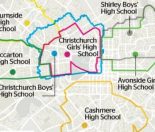Going to intermediate school can mean quite a change in the way your child learns. Find out more about this crucial stage in our introduction to intermediate article.
What is Intermediate School?
An intermediate school is a school that caters for students in Years 7 and 8 (see Year Structure). This covers students who are roughly aged 11 through to 12 years old. This age group is often referred to as the young adolescent age group. These intermediate years of learning can take place at an “intermediate school”, a “full primary school” or a “middle school”.
If your child has been attending a “contributing” school up till the completion of year 6, then he or she will move to a different school, an intermediate school. However, if your child attends a “full primary” school, then you have a choice about whether or not he or she will continue at that school through years 7 and 8 or be moved to an intermediate school or “middle” school.
These years of a child’s life are hugely important and some believe are the last chance a parent has to impart important life lessons and common knowledge. They are a time of rapid change and challenge for both parent and child. The teaching and learning that takes place during these years acknowledges this and caters for this age group in a different way than schooling that comes before and after. It is an important transitional period.
Intermediate schools run five days a week, Monday through to and including Friday. The school day usually begins about 9.00am and finishes about 3.00pm with breaks (intervals) at mid-morning, lunchtime and mid-afternoon.
How is an intermediate school run?
The Board of Trustees –
State primary schools are run by a group called the board of trustees. The board of trustees leads and manages the school ensuring all the time that this occurs within the law. The board is responsible for the management of the schools’ finance, property and grounds. Most board members are parents or community members who are elected or appointed. The board has regular meetings and must listen to what other parents want. (For more info about click BOT.)
The Principal and Teaching staff –
The Principal and teaching staff are the ones directly responsible for the education at school. They are the experts when it comes to the teaching and learning of your child.
The Principal’s role is to manage the day-to-day running of the school. He or she manages the teaching and learning programmes and ensures all of this is carried out to the best of everyone’s ability.
The teachers at a school manage what goes on in the classroom everyday. They determine what is taught on a daily basis and how they will teach it. It is also the teacher’s responsibility to manage behaviours within the classroom and to care for your child during the school hours.
School administration staff –
The school secretary, office administrator or team of people are another integral part of schools. There must be someone to answer phones, give out information, keep records and organise the many things that occur in a school at any one time. These people are very helpful, useful people to get to know in a school.
What will it cost me?
The cost of your child’s education at intermediate level will depend greatly on whether or not you choose to send your child to a state, integrated or independent school.
State Schools –
In New Zealand education provided by state schools is free. The right to free enrolment and free education means that a board of trustees may not make payment of a fee a prerequisite for enrolment or attendance. Schools commonly ask for you to pay school fees or donations which will contribute to the everyday running costs of the school. These are a voluntary payment.
Other costs you may be required to meet are –
Activity/Event charges – there may be opportunities for your child to take part in learning experiences that are optional and you may be asked to pay for these. These activities may be class trips or camps, special projects requiring extra resources, music lessons and so on.
- Specialised subjects costs – there may be materials required for some of the specialised subjects your child may be taught.
- Learning equipment – you will need to pay for the equipment your child needs in order to learn on a daily basis. This includes books, pencils etc.
- Uniform – if the school your child attends has a compulsory uniform you will need to pay for this.
- Others –
From time to time you may be asked to contribute items for class projects. This may be a vegetable or two for a class pot of soup or maybe a piece of fabric to make a costume.
Mufti days – if your child is required to wear a uniform to school they may also have mufti days. Students are asked to make a donation on these days for school fundraising or for a charity.
If you are asked to pay a school donation and are unable to, you need to speak with the Principal of the school. If you are unable to meet any other costs of sending your child to school you may be entitled to financial support. (www.workingforfamilies.govt.nz)
State Integrated Schools –
If you choose to enrol your child at an integrated school you will be asked to pay what is called an ‘Attendance Levy’ or ‘Attendance Due’. Because the land and buildings at integrated schools are privately owned, these schools can charge ‘dues’ to meet costs of maintaining their property.
You may also be asked to meet other educational costs such as those outlined in the state school costs above. These are things like activity/event charges, learning equipment, uniform and other learning related costs.
Independent and private schools –
If you choose to enrol your child in an independent school there will be tuition fees you must pay. The amount of these fees will depend greatly on the school you choose, but you can expect them to be anywhere between $5,000 and $15,000 a year or more.
We live a long way from the school, how will my child get to school?
If you live a long distance from the school your child is enrolled in, and there’s no public transport available for use, they may qualify to use a school bus service or get financial help for transport.
There are criteria that need to be met. Your child must –
- be over 5 and be enrolled in a state or state integrated school,
- live more than 3.2 kilometres from the nearest appropriate school if under 10 years of age.
Students with special education needs also receive help with transport arrangements, usually in the form of taxis.
The Ministry of Education contracts bus operators to provide the service to around 100,000 children each year. About another 10,000 students receive transport allowances because they cannot use a school bus or need to travel a long distance to do so.
For more information about criteria or transport services read our School transport article.
I have to work full time, what about before and after school care?
You need to keep in mind that children under the age of 14 cannot be left home legally without adult supervision. If you’re a working parent you’ll need to consider before and or after school care.
The government and related agencies refer to this care as OSCAR – Out of School Care and Recreation.
The administration staff at your child’s school should be able to give you information about after school care or you can find more information in our Out of School Care and Recreation article.






